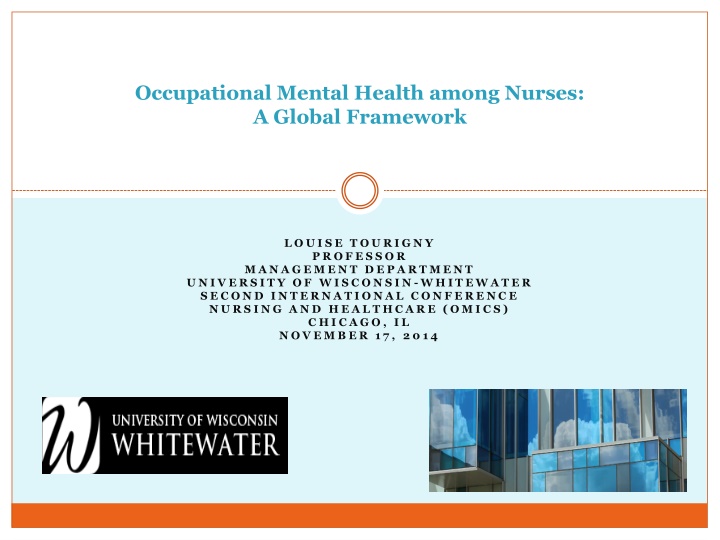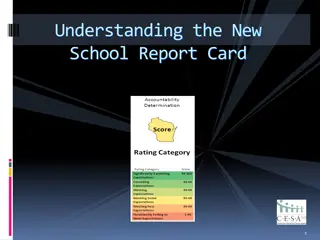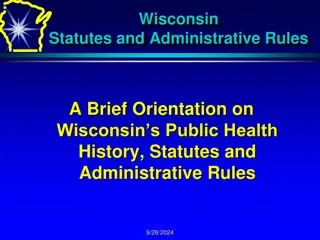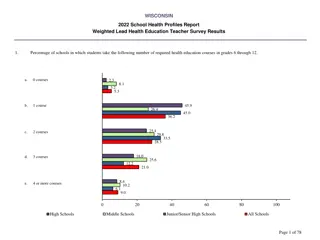
Global Framework for Nurses' Mental Health: Understanding Challenges and Solutions
Explore the complexities of occupational mental health among nurses on a global scale, addressing issues like burnout, job stress, and depression. Discover the impact on patient care, nurse retention, and overall well-being, with a focus on effective coping mechanisms and interventions.
Download Presentation

Please find below an Image/Link to download the presentation.
The content on the website is provided AS IS for your information and personal use only. It may not be sold, licensed, or shared on other websites without obtaining consent from the author. If you encounter any issues during the download, it is possible that the publisher has removed the file from their server.
You are allowed to download the files provided on this website for personal or commercial use, subject to the condition that they are used lawfully. All files are the property of their respective owners.
The content on the website is provided AS IS for your information and personal use only. It may not be sold, licensed, or shared on other websites without obtaining consent from the author.
E N D
Presentation Transcript
Occupational Mental Health among Nurses: A Global Framework L O U I S E T O U R I G N Y P R O F E S S O R M A N A G E M E N T D E P A R T M E N T U N I V E R S I T Y O F W I S C O N S I N - W H I T E W A T E R S E C O N D I N T E R N A T I O N A L C O N F E R E N C E N U R S I N G A N D H E A L T H C A R E ( O M I C S ) C H I C A G O , I L N O V E M B E R 1 7 , 2 0 1 4
Why a global framework? Nursing Global shortage of nurses Increasing demands for healthcare globally HR Adaptive function Retention of nurses Burnout and Depression Costly to nurses Costly to hospitals Mental health Patient safety and satisfaction Well-being of nurses
Occupational mental health Job stress (Karasek) Job Demands-Control-Support Model High job demands, low job control and low social support High job demands, high job control and high social support Predictors of job stress Role stressors: Role conflict, role ambiguity and role overload Burnout (Maslach) Emotional exhaustion: Depletion of physical and emotional resources Depersonalization: Cynicism and psychological withdrawal Diminished personal accomplishment: Inadequacy Depression (Radloff) Negative self-conception that pervades all aspects of life
Outcomes of occupational mental health Behavioral In-role job performance Organizational citizenship behavior Individual Hospital Attitudinal Intention to quit Organizational commitment (mediator)
Moderators of occupational mental health Behavioral Absence Withdrawal and counterproductive Effective coping mechanism or exacerbating Presenteeism Engagement (volitional) Constrained behavior (organizational policies, group pressure) Attitudinal Job satisfaction Extrinsic Intrinsic Organizational factor Supervisory support
An integrative framework Depersonalization Diminished Personal Accomplishment Job demands X Control X Support Job Stress Emotional Exhaustion Depression Role stressors Job Job Absenteeism Presenteeism Performance OCB Intention to quit satisfaction Supervisory Support Organizational Commitment
Extended Karasek Model Job demands X Control X Supervisory Support Samples of hospital nurses 550 China 240 Japan 304 Argentina 252 Caribbean Job Stress In both China and Argentina the interaction of high job control and high supervisory support attenuated the effect of high job demands on job stress In Japan, high supervisory support had a stronger attenuating effect when job control was low In the Caribbean, there was an additive effect: high demands increased job stress whereas high control and high supervisory support lowered it, respectively The interactionist model fits China, Argentina and Japan The additive model fits the Caribbean
Role stressors Sample Hospital nurses 683 India Role ambiguity Role conflict Role overload Job stress Emotional exhaustion Depression Results of the path analysis Step 1: Role conflict and role overload are significant predictors of job stress Step 2: Role overload and job stress are significant predictors of emotional exhaustion Step 3: Job stress and emotional exhaustion are significant predictors of depression
An integrative framework Samples of nurses 550 China 240 Japan In Japan High absence and low job satisfaction increased diminished personal accomplishment when emotional exhaustion was high Depersonalization Diminished Personal Accomplishment Emotional Exhaustion Depression Job Absence X satisfaction In both Japan and China High absence and low job satisfaction increased depression when emotional exhaustion was high High absence and high job satisfaction reduced depression even when emotional exhaustion was high Absence can be both an exacerbating factor and a good coping strategy depending on how satisfied one is with the job
An integrative framework Sample: 197 Chinese hospital nurses and their matched physician supervisors (evaluated job performance and OCB-Individual and OCB- Hospital) Job Performance OCB Emotional Exhaustion Organizational Commitment Intention to quit Organizational Commitment mediates the impact of Emotional Exhaustion on both OCB-I and OCB-H and Intention to Quit Emotional Exhaustion does not impact Job Performance either directly or indirectly
An integrative framework Sample: 402 hospital nurses in Turkey Test: Yerkes- Dodson Law Presenteeism Job Job Stress Performance Inverted U-Shape Less than 5% used 5 or more days of medical absences About 7% used 1 to 5 days 88% did not use any day of medical absences 73% indicated being at work while ill at least once during the year prior to the survey Job performance 7 High presenteeism 6 5 No presenteeism 4 3 1 2 3 4 5 Job stress
Conclusions Job stress is impacted by high job demands, and role overload Job stress and emotional exhaustion predict depression Supervisory support significantly reduces job stress Job control shows mixed results Job satisfaction is an important moderator Absence can be restorative and used as an effective coping strategy Absence can also be a negative withdrawal mechanism Whether absence is a withdrawal or coping mechanism depends on how satisfied one is with the job Presenteeism is associated with higher job performance when stress is either low or high Organizational commitment is a mediator of the impact of emotional exhaustion on OCB and intention to quit
Discussion HR Intrinsic and extrinsic facets of job satisfaction Training and development of supervisors Job design (balance job demands and control; reduce role overload and role conflict) Absence policy has its limitations The meaning of absence depends on important attitudinal factors Nurses who are satisfied and use absence report lower symptoms of depression even when emotional exhaustion is high The impact of the behavior depends on the extent of job satisfaction Presenteeism is prevalent among high performers Is it constrained behavior? Is it associated with high engagement? The inverted U-shape job stress-job performance relationship applies to nurses who do not report presenteeism Job design should address the inverted U-shape job stress-job performance relationship (avoid under or over activation)
References 1.Baba, V.V., Tourigny, L., Wang, X., Lituchy, T., & Monserrat, S.I. (2013). Stress among nurses : A multi-nation test of the demand-control-support model. Cross-cultural Management : An International Journal, Vol. 20, Iss. 3, pages 301-320. 2.Tourigny, L., Baba, V.V., Han, J., & Wang, X. (2012). Emotional exhaustion and job performance : The mediating role of organizational commitment. International Journal of Human Resource Management, 24 (3), 514-532. 3.Tourigny, L., Baba, V.V. & Wang, X. (2010) Burnout and depression among nurses in Japan and China: The moderating effects of job satisfaction and absence. International Journal of Human Resource Management, 21 (15), 1-2761. 4. Tourigny, L., Baba, V.V., Zamantili-Nayir, D. (2012). Stress and job performance: The moderating effect of presenteeism. The 10thEuropean Academy of Occupational and Health Psychology Conference, Zurich, Switzerland.






















